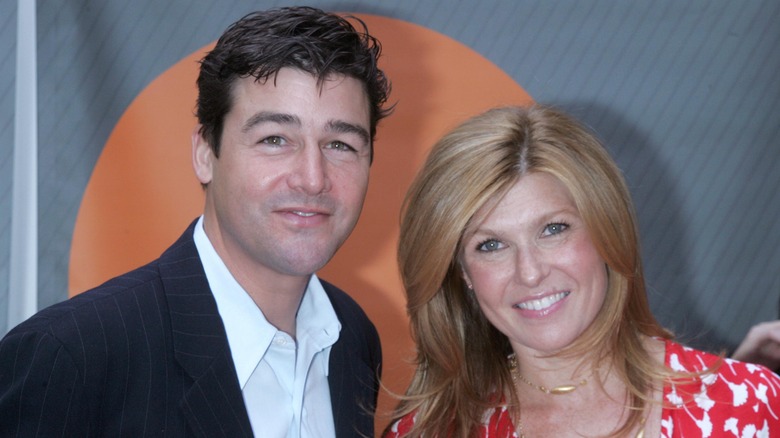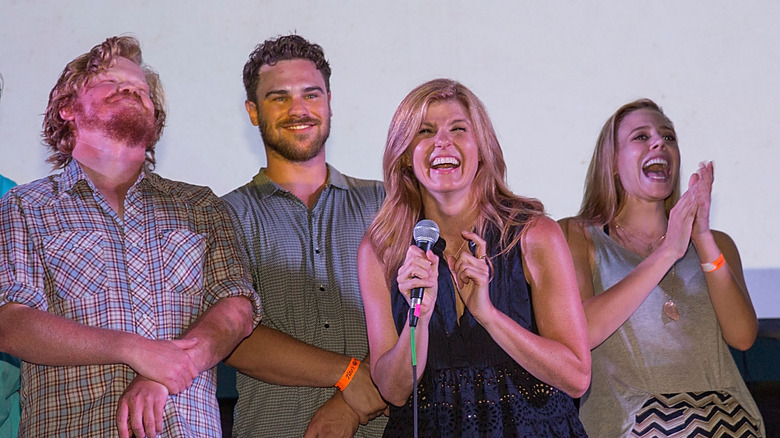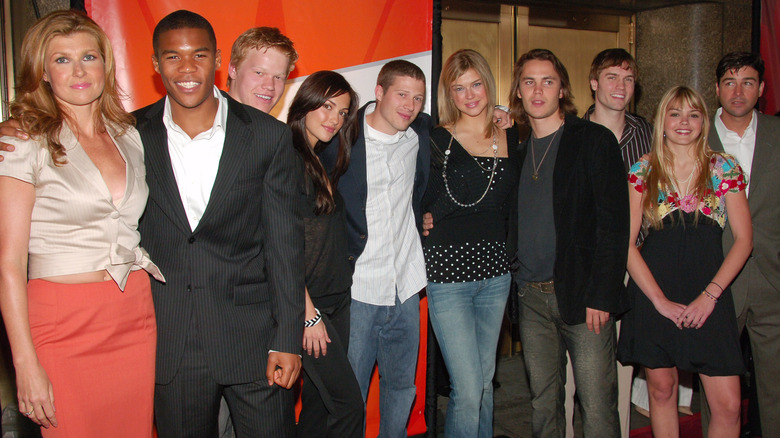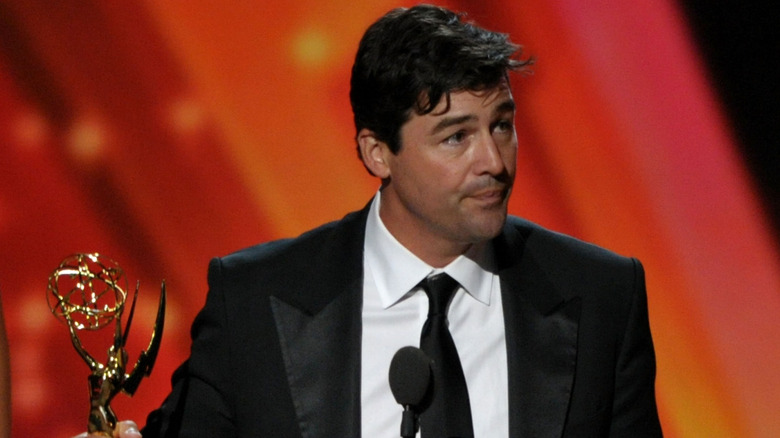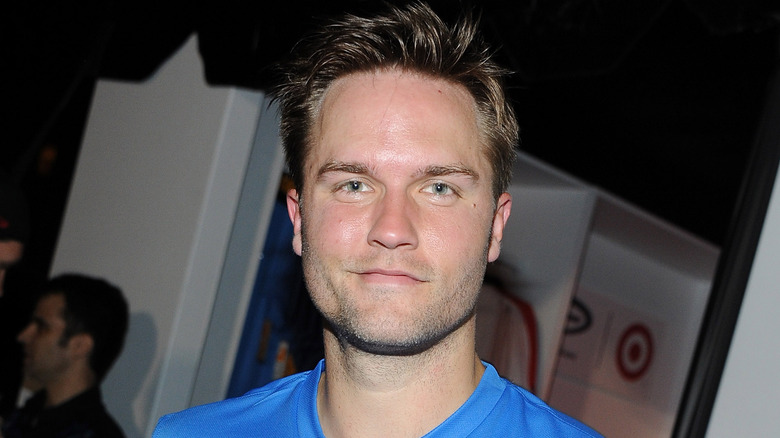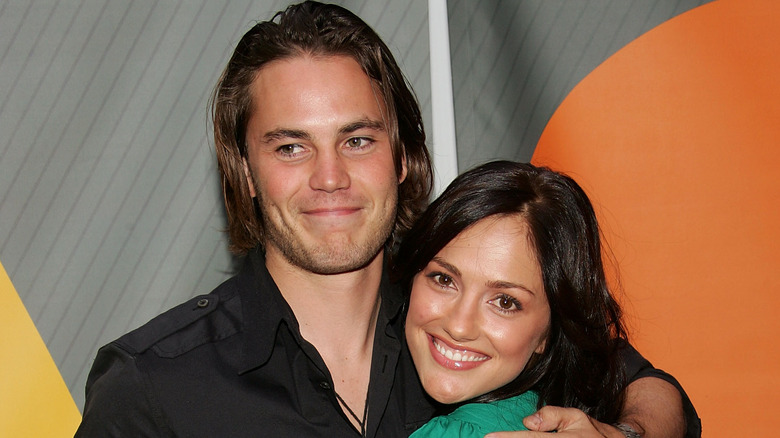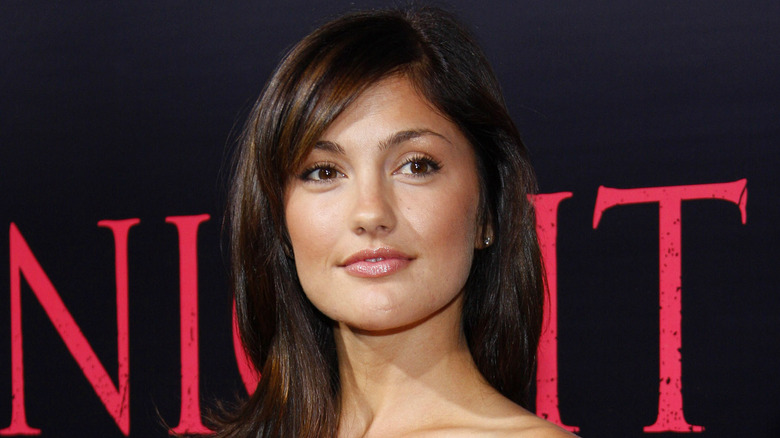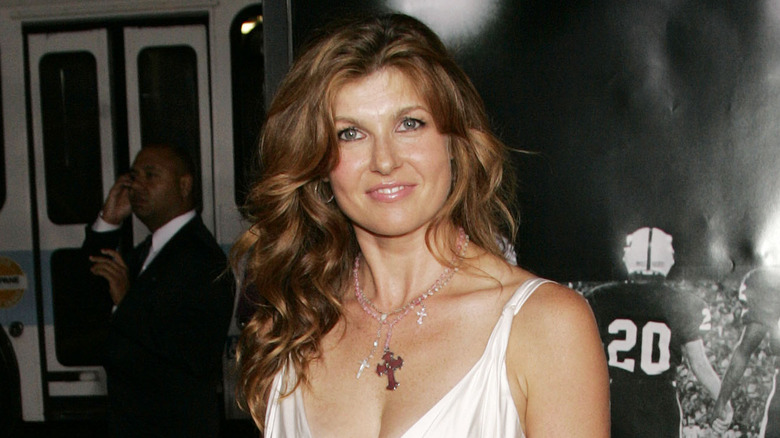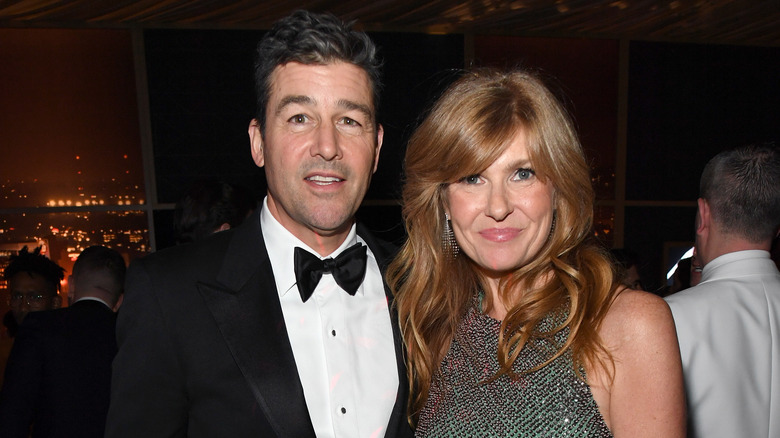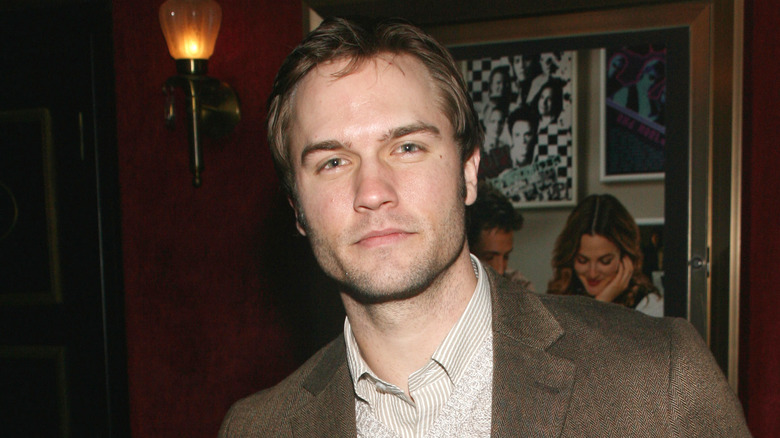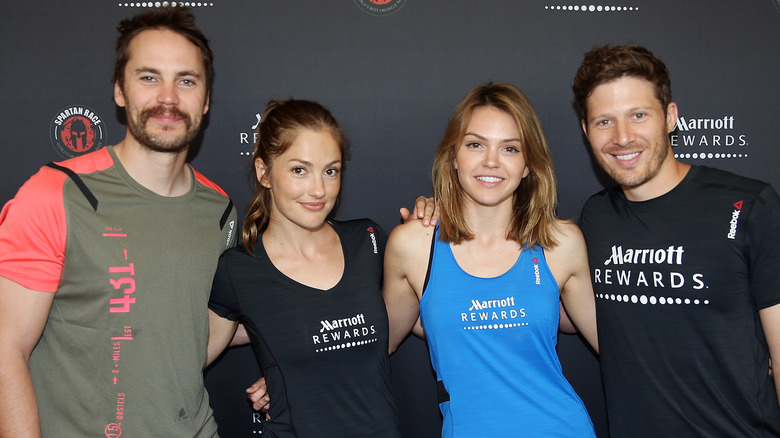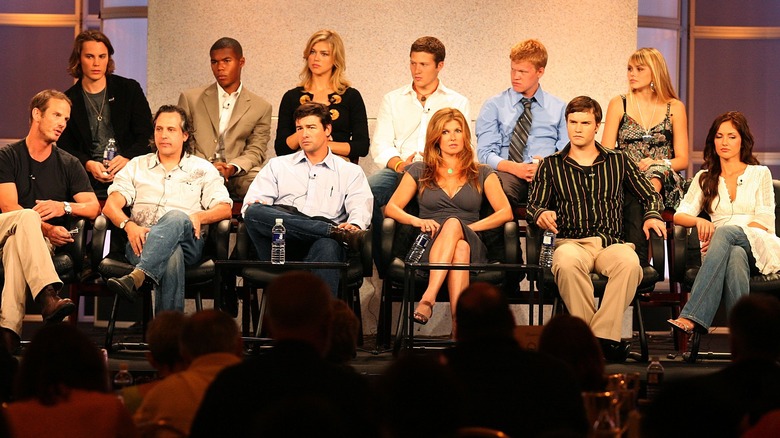Surprising Friday Night Lights Behind The Scenes Facts
"Friday Night Lights" has been featured on many lists of the best contemporary television shows, and its legions of fans are nothing if not diehard. For years, people have been clamoring for a reunion movie or reboot series — and though no one involved with the show sees that as a possibility, it has not stopped many from wishing it into fruition.
Though its 20-year anniversary is not far off, 2006's "Friday Night Lights" remains a cultural touchstone, and cast and crew interviews have brought forth many behind-the-scenes details in the years since the show went off the air. If you have a continued interest in the cast, characters, and the show as a whole, then keep reading.
"Friday Night Lights" was based upon a 2004 film of the same name, itself based upon H.G. Bissinger's 1990 book, "Friday Night Lights: A Town, a Team, and a Dream," which followed a real small-town Texas football team and the coach that was their guiding light. The show borrowed from the book and the film, but branched out from football to also focus on small-town politics, social issues, and the dynamics of romantic relationships. Set in the fictional town of Dillon, Texas (there is a Dillon elsewhere in Texas, but with no connection to the show), the series offered a thoroughly authentic, complex picture of rural Texas life. Here are some surprising "Friday Night Lights" behind the scenes facts you may not know.
The cast didn't have marks and cameras had to adapt
Actors typically spend ample time rehearsing a scene before filming it, and a big part of that includes going over their marks — where they need to stand or land when they deliver a line. Marks are used to ensure that the operators know beforehand where to shoot their camera.
"Friday Night Lights" did things very differently from most contemporary television series, in that they generally did no rehearsal before filming. "There was very little red tape that we couldn't cross and we could go anywhere," Michael B. Jordan, who played Vince Howard, explained to The Hollywood Reporter. "Our set was our world and we could move around and do whatever we felt was right. It doesn't really happen that often in Hollywood."
Others have echoed this sentiment, such as star Connie Britton, who told EmmyTVLegends.org, "We were given the freedom and it worked so beautifully with our writers." According to cinematographer Todd McMullen, the crew used three cameras and had to make on-the-go adjustments due to the lack of marks. This contributed to the show's trademark shaky camera, which made it look more realistic. This method also decreased the amount of time people spent on set. "Everybody knew what they were doing coming in, and once we hit our groove, we would wrap days in eight hours," Scott Porter, who played Jason Street, said to Honest Reviews Corner. "We ended up shooting an episode in five and a half days."
Everything was shot on location, using local extras
Setting was also crucial in ensuring "Friday Night Lights" established an authentic portrayal. The show used no sound stages, except for a locker room that was built and occasionally painted to be used for two opposing teams. All homes, restaurants, schools, and everything in between were actual places — even the show's Alamo Freeze was a real-life Dairy Queen.
"I remember telling the studio, 'No, we're not going to build any sets. Pete doesn't think he needs sets,'" former Imagine Television head David Nevins said in an oral history of the show for Grantland. "'Well, what are you going to do about the coach's house? You've got to build that.' 'No, we're going to rent a house, and we'll make sure it's a house we can get back into whenever we need it.' These were fairly radical ideas."
The show also made a point to use local actors for supporting and minor roles, which executive producer Peter Berg credited with helping the show's success in a 2007 interview with NPR. The crew kept things so real that they didn't adjust anything when entering a new filming location. "If we're shooting in a restaurant, we just take a regular restaurant the way it is, the way it's lit," Berg said. "We hire ... the local cooks, local waitresses in their costumes. We tend to not dress them." Local customers were encouraged to hang out, as well.
Kyle Chandler almost wasn't cast as Coach Taylor
It's hard to picture anyone but Kyle Chandler's starring as the full-hearted Coach Taylor in "Friday Night Lights." But it turns out that the executive producer and developer of the series, Peter Berg, originally wanted someone like Billy Bob Thornton — who played the part in the "Friday Night Lights" film — in the role.
In fact, he had his eye on country musician-turned-actor Dwight Yoakam for a while. "He seemed interesting — kind of a flawed, messed-up Southern boy who wanted to act. I met with him a couple times, but then he started making demands," Berg told Grantland. "He made it impossible for us to say yes."
Berg only knew Chandler from his work on "Early Edition," and he felt the actor was too pretty and polished for the role — an opinion that Chandler inadvertently changed when he rolled in for a meeting after days of partying. "I was extremely hungover, and I had smoked, like, 20 cigars — it was either my birthday or someone else's birthday, but it was a big bash — and I hadn't shaved or probably showered in a few days," Chandler recalled in an interview with The Hollywood Reporter. "So I show up on my motorcycle, probably late, and I just remember him looking at me and going: 'That. That's exactly what I f***ing want right there, just do that.'"
Scott Porter took his character's axing as 'a punch in the gut'
Having a role on a network series is a plush gig, especially for an up-and-coming actor. It makes sense, then, that Scott Porter took his character Jason Street's axing hard. He found out his character was being written off the show while at a comic book convention as he prepared to take the stage for karaoke (Porter is a fantastic singer who was the runner-up on Season 11 of "The Masked Singer").
After receiving a conference call from Peter Berg and head writer Jason Katims, the actor told Entertainment Weekly that he knew something was up. "Thank God for Pete's straightforward nature, the honesty was refreshing," he recalled of the conversation. Porter was informed his character's story arc was going to be wrapped up in only four episodes, making him a guest star for Season 3 rather than a main player.
"It was a punch in the gut, I was upset, angry, but then I really started to think about it," Porter explained. "I really feel like we had painted Jason into a corner by cutting him off from so many of the characters on the show over the first two years." Things ultimately worked out well for the talented actor, as he has since appeared on a number of successful television series, including "The Good Wife," "Hart of Dixie," and "Ginny & Georgia."
Peter Berg warned Minka Kelly and Taylor Kitsch not to date
The world was given ample insight into the romance between castmates Minka Kelly and Taylor Kitsch when Kelly published her 2023 memoir, "Tell Me Everything." Despite having some very famous exes — like Trevor Noah, Derek Jeter, and Wilmer Valderrama – her relationship with Kitsch was the only high-profile romance Kelly discussed in the book. Much of what she detailed was in relation to how the "toxic" romance affected her time on the "Friday Night Lights" set, but Kelly also recalled the intensity of her chemistry with Kitsch. She even noted that others were able to pick up on their vibes, which resulted in a warning from executive producer Peter Berg.
Berg invited the young actors to a breakfast, where he told them they should absolutely avoid dating. "He basically said, 'Don't f***ing do it. It's not a good idea and it always ends badly,'" Kelly wrote (via Today). "He didn't know he was too late. Or at least pretended he didn't." Kitsch confirmed the on-again, off-again relationship in 2018, but the exact dates remain unclear.
In her book, Kelly confessed that she wished she had listened to Berg's advice because of the on-set drama the romance created. "We were young and had very few tools to handle our emotions and personal grievances," she wrote (via The Daily Beast). "On the days we had to work together and were broken up, he didn't want to be in the hair and makeup trailer at the same time I was."
Minka Kelly felt disconnected from the cast, especially the other women
In her memoir, Minka Kelly detailed her uneasiness on the "Friday Night Lights" set, especially when it came to interacting with the other women in the cast. "I guess that's just what happens when you work together on a show; it's a lot of pressure, and filming scenes again and again with the same people can sometimes bring out aspects of personalities that are less than stellar," she wrote (via Today). "There was often stress between the people I'd thought of as my friends, and I was left feeling lonely and confused."
Whenever she felt lonely, Kelly turned to Taylor Kitsch for support, which stopped her from developing — or repairing — bonds with others. "All the effort I might have invested in connecting consistently with the girls on the show went to Taylor," she recalled.
Things were particularly bad for Kelly when she and Kitsch hit the outs, as she felt she had no one to turn to for sympathy. The actor detailed how she felt her castmates took Kitsch's side in the breakup, making her feel alienated. "I'd show up to work with a smile on my face thinking I was being professional, while everyone else felt sorry for the guy whose heart had just been broken," she wrote (via The Daily Beast). "My co-workers weren't taking me out for drinks after work to mend my broken heart; they were taking him out."
Connie Britton first said no to playing Tami Taylor
If Kyle Chandler was the beating heart of "Friday Night Lights," then Connie Britton was the cardiac conduction system responsible for the beat. Coach Taylor's relationship with his wife, Tami Taylor, was central to the show's success, and it's almost unimaginable to think of any other actor going toe-to-toe with Chandler the way Britton did. And yet, Britton's participation in the series was not always a guarantee.
While she appeared as the coach's wife in the 2004 "Friday Night Lights" film — her character there was named Sharon Gaines — the actor was reluctant to sign on for a television adaptation. "She said, 'Are you f***ing kidding me? You think I'm going to spend 10 years sitting on a hard-wood bleacher getting splinters in my a** and cheering on Kyle Chandler?'" Peter Berg told Grantland.
After Berg assured Britton her character would get "dimension" and "a real voice," she hesitantly agreed to sign on for the show. Britton's character was a fan favorite, and her marriage became a pivotal part of the narrative. Tami served as an important voice of reason as a mother, a mentor, and a school professional. The character went from being Dillon High's guidance counselor to its principal, and later found work as a dean at a Philadelphia college. For Britton, who received two Primetime Emmy Award nominations for the role, it was a career-defining character. "Who am I, if I'm not Tami Taylor?" she once asked on "Chelsea Lately" (via The New York Times).
Connie Britton and Kyle Chandler took a road trip before filming
Though it was a show about football, the core of "Friday Night Lights" was the relationship between Coach Taylor and his wife, Tami — and the sizzling heat between Kyle Chandler and Connie Britton was palpable on-screen and off. The two clicked immediately, to the point where the powers-that-be were actually concerned by their chemistry.
"I was really worried. Connie and Kyle developed a very flirtatious, precocious relationship right off the bat. And Kyle, of course, is married," Peter Berg recalled to Grantland. The executive producer was radically against the actors' plans to drive to Austin from Los Angeles together as a means of bonding during the move. "I was convinced they would be having some torrid affair by the time they reached Santa Fe and Kyle's marriage would be over by the time they got to Austin. I was wrong about that, thank God," he said.
Berg wasn't the only person who noticed the palpable tension between the pair. In Grantland's oral history, producer and director Jeffrey Reiner said that Chandler and Britton were so in sync that he first thought they were sleeping together. Ultimately, what developed between the duo was a deep friendship, and the actors even told the writers they refused to act out an affair because they loved the characters together so much. They also had a hand in avoiding love scenes; their first, in the second episode of the series, was so awkward that it was cut, and no others were ever written.
Scott Porter had advisors to help him portray disability accurately
In today's day and age, representation of diverse identities in TV is expected, and these depictions should be accurate and respectful, particularly when they relate to identities that are marginalized and oft misunderstood. But when "Friday Night Lights" hit television screens two decades ago, many shows were not paying attention to identity issues the way they should. When Scott Porter's character Jason Street is irreparably injured on the field, it marked one of the show's defining moments. The minds behind "Friday Night Lights" weren't just thinking about how to represent a player with a disability accurately, but that they actually had people on set ensuring their vision came to life, including Paralympic coach James Gumbert.
Porter's character didn't begin the series in a wheelchair — which is why the actor feels they needed a non-disabled person in the role – but the spinal cord injury he experiences occurs in the very first episode. Porter was then relegated to a wheelchair for the remainder of his time on the show, and he put a lot of effort into researching what that would be like for a person. "I met with a team of technical advisers — a quad rugby coach and an occupational therapist — and I spent days with people who had a similar injury to mine, like an 18-year-old kid who was bucked in the pen at his first pro bull-riding event," Porter told Vanity Fair.
The actors' improvisation is responsible for some cool details
There are some writers who are notoriously picky about actors sticking to the script. Aaron Sorkin, for example, required actors on "The Newsroom" and his other shows to memorize every single word of the script, with no ad-libbing or paraphrasing allowed. "Friday Night Lights" was certainly not like that, and the tendency of the show to film without much (or any) rehearsal allowed for a lot of organic improvisation to arise.
At times, no lines were even written at all. For instance, Scott Porter wasn't told what to say when his character was injured in the first episode — all he was told was to say whatever felt right in the moment when dealing with the EMT that rushes over. In many other instances, the cast simply played around with dialogue and what stuck, stuck.
Peter Berg was so into the idea of improvisation that he incorporated it into the audition process. "We would throw like, any curveball we could at them and see who could kind of handle it, and who would get excited about that and play with it," he explained on NPR. "Those would be the actors that we would be drawn to." Some great lines arose from the minds of the actors, like when Connie Britton's Tami told her husband, "You're an idiot," after their daughter is caught under a blanket with one of his players. The cast even contributed key details, such as Jason Street's nickname, Six, which was randomly thought up by Taylor Kitsch.
Everyone either hates or regrets the murder storyline
While everyone involved with "Friday Night Lights" seems to be proud of its legacy, there is one storyline that pretty much everyone dislikes — the Season 2 storyline where Jesse Plemons's Landry Clarke murders a man who sexually assaulted and was continuing to target Tyra Collette, played by Adrianne Palicki. Though the storyline was dropped by the time the next season rolled around, it was definitely a low point in the series.
"It was a disaster. I went crazy when I read that. That opening episode, you've got a murder," Peter Berg remembered in the Grantland oral history. The plot was so ill-received that, when the season was interrupted by a writer's strike, writers were being asked about the terrible storyline on the picket lines. Even Connie Britton listed it as her least favorite storyline in a 2013 appearance on "Watch What Happens Live with Andy Cohen."
Part of the reason for the murder plotline was a perceived pressure to do something grand. "We were coming to the end of Season 1, and the show was critically well-received, but the numbers ...," stated executive producer and writer David Hudgins in the Grantland piece. "So we thought, let's do something big, something shocking and titillating and provocative." The plotline certainly didn't help matters, as the show was subsequently set for cancellation before a DirecTV deal saved it at the last minute. This near cancelation lit a creative fire in the writers, but that murder plot lives on in infamy.

